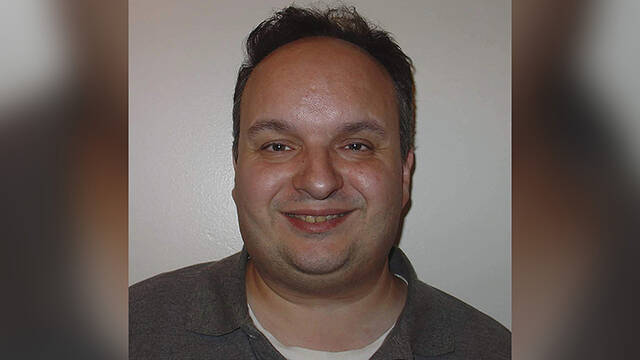A federal lawsuit filed Tuesday alleges that a Penn Hills man with autism who was incarcerated at Allegheny County Jail was denied medical treatment for a wound on his foot that led to his death from sepsis.
The complaint also alleges that the doctor who treated Anthony Talotta had lost his license to practice medicine — or had been denied it — in at least eight other states prior to being hired to work in the jail.
The lawsuit, filed by the Abolitionist Law Center and attorney Alec Wright, names as defendants the county; Allegheny Health Network, which was contracted to provide medical care at the jail; and treating physician Dr. Wilson Bernales, medical director Dr. Donald Stechschulte and a medical staffing agency.
A spokeswoman for the county said she could not comment on pending litigation.
AHN officials also said they could not comment on the lawsuit. Bernales was suspended last year and never returned to work for AHN.
The 40-page lawsuit was filed by Jeffrey LaGrotteria, who is Talotta’s cousin and administrator of his estate.
It includes claims for failure to train or supervise, inadequate screening, denial to adequate medical care, disability discrimination, negligent hiring, medical negligence and wrongful death.
At least 17 people died at the jail between March 2020 and September 2022.
According to the lawsuit, Talotta, 57, entered the jail on Sept. 10, 2022, after he was accused of assaulting a worker at a group home for people with autism spectrum disorder.
When Talotta arrived at the jail, he had several fractures and an active infection in his right foot from having a metal sink with boiling water fall on him, the lawsuit said. He also had previous diagnoses of anxiety, depression, diabetes, high blood pressure and autism.
“Almost at once, he was stripped of his ability to receive adequate medical care at the ACJ because of his autism,” the lawsuit said.
Talotta was placed in the mental health housing unit and did not receive necessary medical care, the complaint said.
At intake, jail staff knew about the foot injury as well as Talotta’s history of psychiatric hospitalizations, the lawsuit said. Jail medical staff described him as “vulnerable.”
They said that Talotta suffered from severe mental disabilities, autism, anxiety and depression, the complaint said.
The lawsuit said Talotta received no wound care at the jail, and that documents for that care are completely blank, while his records have no information about medication management.
The lawsuit also claims his medical records were changed after Talotta’s death.
The lawsuit said Talotta was taken to Allegheny General Hospital a day after he had entered the jail. There, the lawsuit said, doctors found that Talotta had previously unidentified fractures and a torn ligament in his foot. They splinted it and discharged him with crutches.
However, the lawsuit alleges that when he returned to the jail, Talotta’s crutches were taken from him, as were his walking boot and splint because he wasn’t permitted to have those on the mental health pod.
The complaint said that Talotta should have been housed on the medical housing unit, but it refused people with intellectual or developmental disabilities.
On Sept. 12, 2022, staff at the jail received test results showing Talotta’s foot was infected with at least three different bacteria. Still, the lawsuit alleges, he was denied medical treatment and wound care.
A day after the test results, the lawsuit said, it was ordered that Talotta take an oral antibiotic. But his attorney said he never received it at the jail.
On Sept. 14, Talotta was taken to West Penn Hospital for worsening blistering of his foot. He was discharged the same day with orders for daily wound checks and dressing changes. Back at the jail, he was held on the mental health unit and never taken for medical care, the lawsuit said.
“There is no documentation that Mr. Talotta received any wound care at the ACJ,” according to the complaint.
At around 8 p.m. Sept. 20, Talotta was found unable to speak, clutching his chest, with an altered mental state and increased blood pressure, which the lawsuit said were obvious symptoms of sepsis.
Bernales, who knew about the wounds to Talotta’s foot, gave him Benadryl and ordered him back to his cell.
Less than three hours later, Talotta was found unresponsive and foaming from his mouth on the floor of his cell.
He was taken to UPMC Mercy where he died from sepsis at 10:46 p.m. Sept. 21.
Had Talotta received adequate medical care at the jail, the lawsuit said, he would not have died.
The lawsuit also accuses the defendants of failing to screen Bernales, whose medical license had been suspended, revoked or denied in at least eight different states, including Connecticut, Delaware, Louisiana, New Mexico, New York, Oklahoma, Virginia and Wyoming.
In Oklahoma, the lawsuit said, he was found unfit to practice medicine in 2017 and suspended for five years, after which he was not reinstated.
According to Pennsylvania’s medical license verification database, Bernales’ medical license is currently active and good through 2024. It was last renewed in December 2022.
Bernales, who is now living in Nevada, told the Associated Press on Tuesday that he has never had any malpractice issues and called the medical license issues in other states “administrative concerns.”
Bernales challenged the claims in the lawsuit and medical records, saying Talotta was permitted to keep the wound care supplies. The boot and crutches were taken away, Bernales told the AP, because no prisoners are allowed to have them since they could be made into weapons.
“I had planned to do the dressing changes all in house. He went to the hospital twice to receive care,” Bernales said. “It’s not like a hospital. I can’t just go to the patient’s cell and provide care. If the corrections officers say we don’t have enough staff to bring him out of his cell to get care, then I have to listen.”
The Associated Press contributed to this report.













